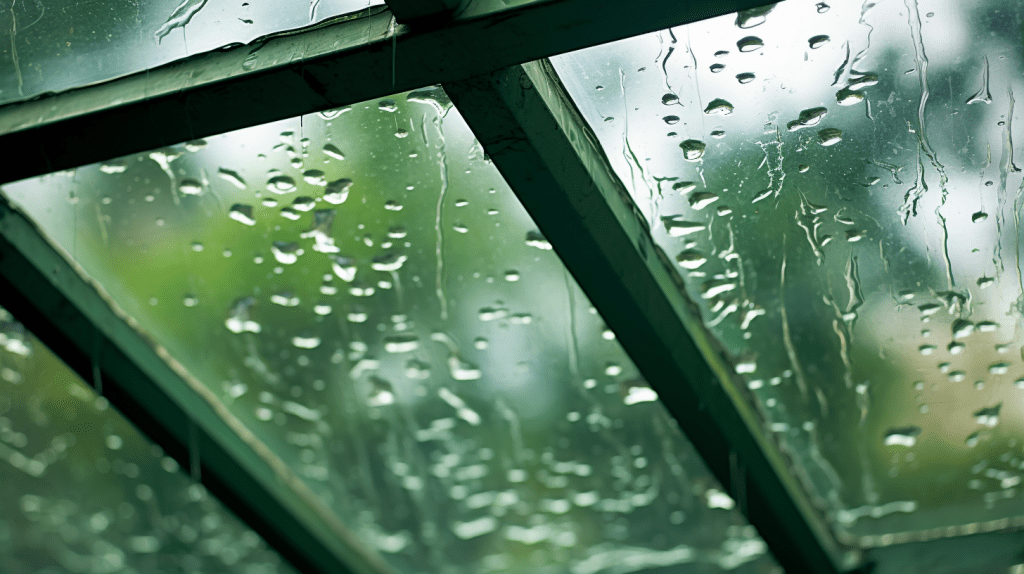A conservatory is designed to be a tranquil space. It is an area to enjoy the beauty of the outdoors but reap the benefits of a warm and peaceful environment.
However, the soothing ambience of your conservatory can quickly turn into a thunderous racket when heavy rain starts to fall.
If you’re fed up with your peaceful retreat being restricted by the weather, we’ve got you covered.
We’ll explore why rain noise can be especially amplified on certain conservatory roofs, investigate the specific challenges faced by different types of roofing, and provide practical solutions to reduce rain noise.
Why is the rain so loud on my conservatory roof?
Various factors, including the age of the conservatory, the roofing material, and the roof’s pitch, can influence the level of rain noise in your conservatory.
Age of the Conservatory
Older conservatories, constructed with traditional designs and materials, often lack the advanced sound insulation features found in more modern or renovated structures.
Many older conservatories don’t benefit from newer insulation technology. Improved insulation helps in reducing the transmission of sound, including the noise of the rain hammering on the roof.
Newer conservatories often opt to install insulated panels on the roof that not only keep in the heat but also help to mute the noise of bad weather. Upgrading to newer, noise-resistant roofing materials can make a notable difference in minimising rain noise.
Many older conservatories only have single-pane windows that are less effective at blocking noise, allowing rain sounds to be more audible. Double-glazed windows, a common feature in modern conservatories, offer enhanced insulation against external sounds.
Over time, the wear and tear on older conservatories can compromise their structural integrity. Gaps, cracks, or deteriorating seals may allow more sound to penetrate, intensifying the impact of outdoor noise. Regular maintenance may be needed to keep on top of damaged materials, and it may be beneficial to have an assessment to see if replacing the roof with insulated panels may be more cost-effective in the long run.
Roofing material
The type of material used for the conservatory roof can hugely impact how loud rain sounds. Different materials absorb and transmit sound in distinct ways, influencing the overall noise level.
Polycarbonate roofing: Polycarbonate roofs are known for amplifying rain noise. The material’s characteristics, including its lightweight and rigid structure, make it intensify the sound of raindrops, producing a distinctive drumming sound. The loud sound can make your conservatory almost unusable in heavy rainfall.
Glass roofing: Glass roofs typically offer better sound insulation compared to polycarbonate. However, the sound of rainfall can still vary based on the thickness and type of glass used. Light rain on a glass roof may produce a gentle tapping sound, while heavier rain might create a more thundering noise.
Tiled or solid roofing: Tiled or solid roofs, often made of materials like slate, concrete, or composite tiles, tend to absorb and dampen rain noise effectively. Rainfall on a tiled or solid roof is generally quieter compared to polycarbonate. The sound is muffled, providing a quieter indoor environment during rain showers.
Insulated panels: Modern insulated panels, like CosyPanels, are designed for noise reduction and thermal efficiency and offer a quiet and comfortable indoor experience during rain. If your property is set in a particularly noisy location, check out the CosyPanel+ range. The range has an enhanced thermal layer with a thermal break in the aluminium design, which not only reduces condensation risk but also holds additional acoustic benefits. The break reduces any impact sound from the metal outer layer, providing added sound protection whatever the weather.
Pitch of the Roof: The pitch or angle of the conservatory roof affects how raindrops hit the surface. Flat roofs can amplify the noise, creating a louder impact. Well-designed roof lanterns can be strategically placed to direct rainwater away from the centre of the roof. This can help reduce the direct impact of raindrops on the glass or roofing material, minimising noise. Roof lanterns with a pitched design can help divert rainwater more effectively than flat roofs.
How to reduce rain noise on a conservatory roof
If you are trying to minimise the noise on a smaller budget, you can try these tips:
Rugs, carpets, and soft furnishings: Introducing soft furnishings into your conservatory can help dampen rain noise. Placing rugs or carpets on the floor and adding soft cushions to seating areas help absorb sound, reducing the overall noise level.
Noise-reducing sheets: Incorporating noise-reducing sheets into your conservatory’s interior can be an effective solution. These sheets are designed to absorb and dampen sound, providing a quieter and more comfortable indoor environment. They have a shorter life span than roof panels and will need to be measured and cut to fit your existing roof.
Blinds: Choosing blinds made from sound-absorbing materials, such as heavy fabrics or textured materials, can help absorb and dampen the impact of raindrops. Blinds act as a physical barrier between the glass roof and the interior space. When rain hits the glass, the blinds create a buffer zone that can help diffuse and soften the impact, reducing the intensity of the noise that reaches the room.
It’s important to note that while blinds can be effective, the extent of their impact on rain noise depends on many other factors. Considering them as part of a broader soundproofing strategy will achieve better results.
Upgrade your old conservatory roof
For a comprehensive and long-term solution, it is worth exploring upgrading your conservatory roof.
Modern roofing solutions, such as CosyPanels, are designed with advanced materials that significantly reduce rain noise. These panels not only enhance insulation but also provide a quieter and more comfortable indoor environment.
When faced with a noisy conservatory roof, the decision to upgrade or repair can be a tricky choice. Considering how long the repair will last and the cost is something to remember when weighing up investment. Although in the short-term, the prices for repair may seem cheaper, if the repair doesn’t fully help with noise reduction or requires further repairs a year later, then the costs will quickly mount up.
Roof panel installers such as CosyPanels offer a 10-year Guarantee, so you can rest assured it is a protected long-term investment.
Upgrading to a modern, noise-resistant conservatory roof, like CosyPanels, is a transformative solution. These panels are specifically engineered to minimise rain noise while providing excellent insulation.
The investment in a CosyPanels upgrade not only resolves the noise issue but also enhances the overall comfort and energy efficiency of your conservatory.
If a full upgrade is not currently feasible, consider having an evaluation to see what alternatives are available. With the installation of thermal roof panels, there is generally no structural change needed. The panels can be installed in one day, allowing you to enjoy your transformed living space immediately.
Make your retreat peaceful all year round
Reducing rain noise on a conservatory roof is a common challenge, particularly for those with polycarbonate roofs. While short-term solutions like rugs and noise-reducing sheets may offer relief, the most effective and long-lasting answer lies in upgrading to a modern, noise-resistant roof like CosyPanels.
By investing in an upgraded roof, homeowners can not only enjoy a quieter conservatory but also benefit from improved insulation and energy efficiency. Don’t let rain noise disrupt your peaceful retreat—explore the possibilities of a CosyPanels upgrade and transform your conservatory into the relaxing retreat you deserve.
Request your FREE QUOTE for a CosyPanels upgrade.


